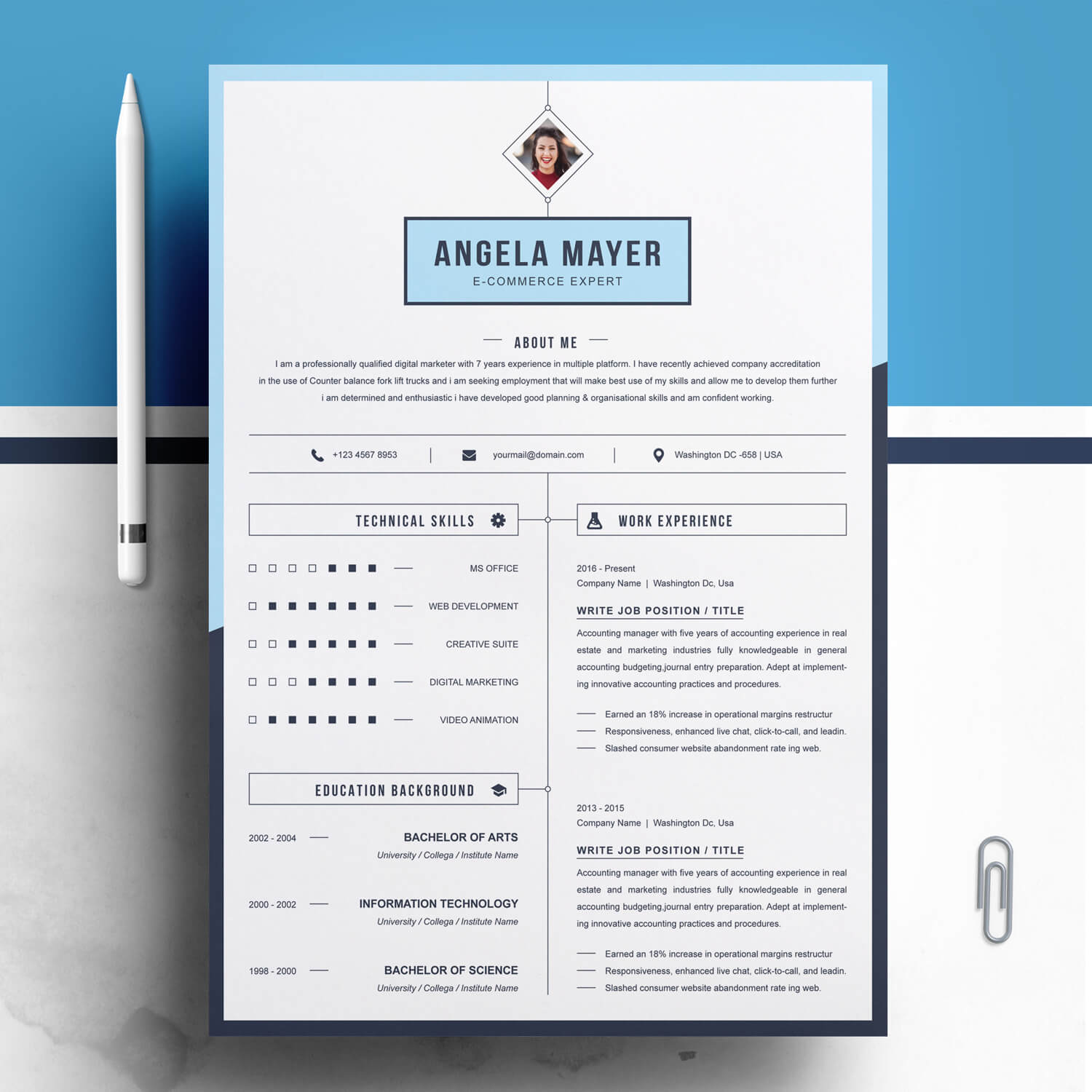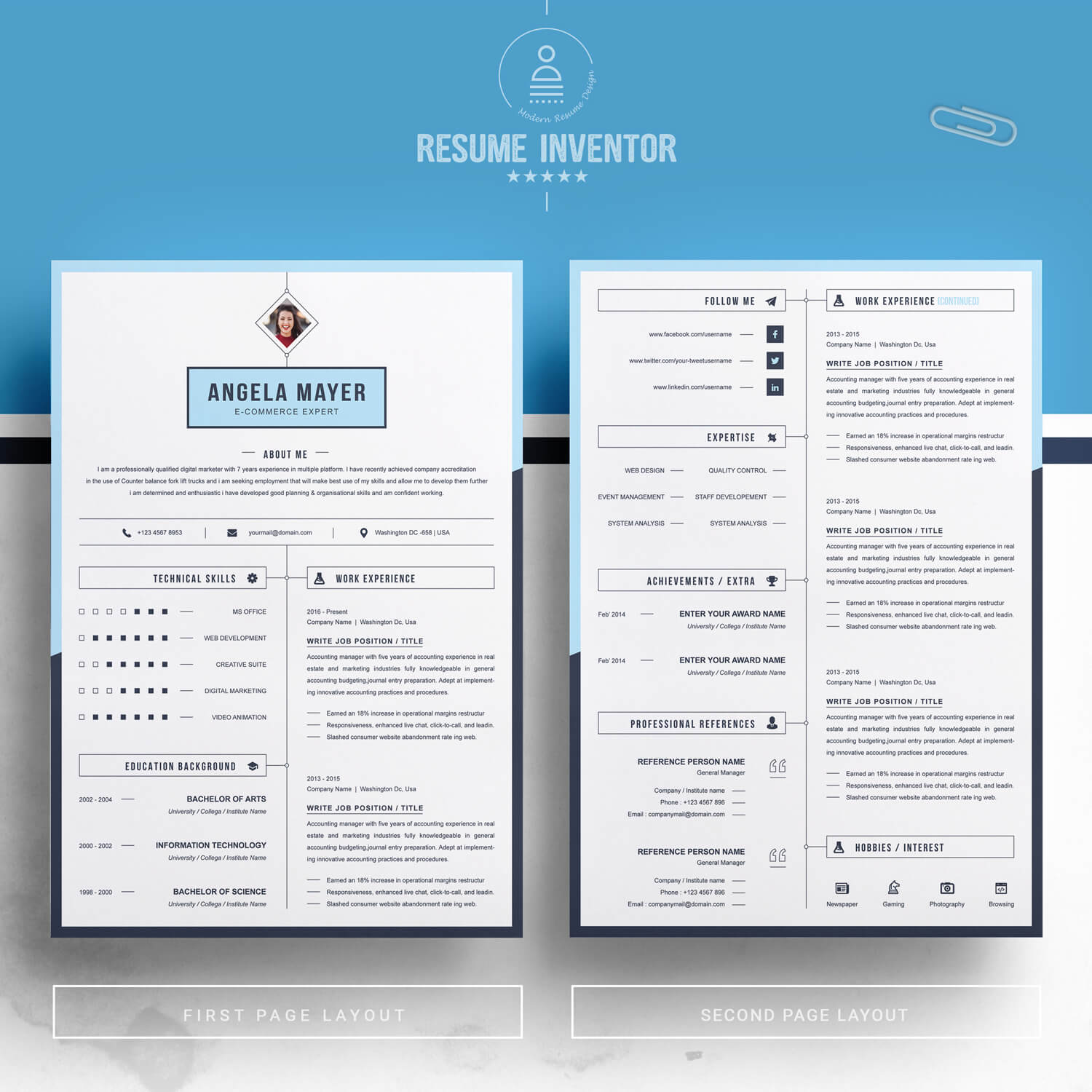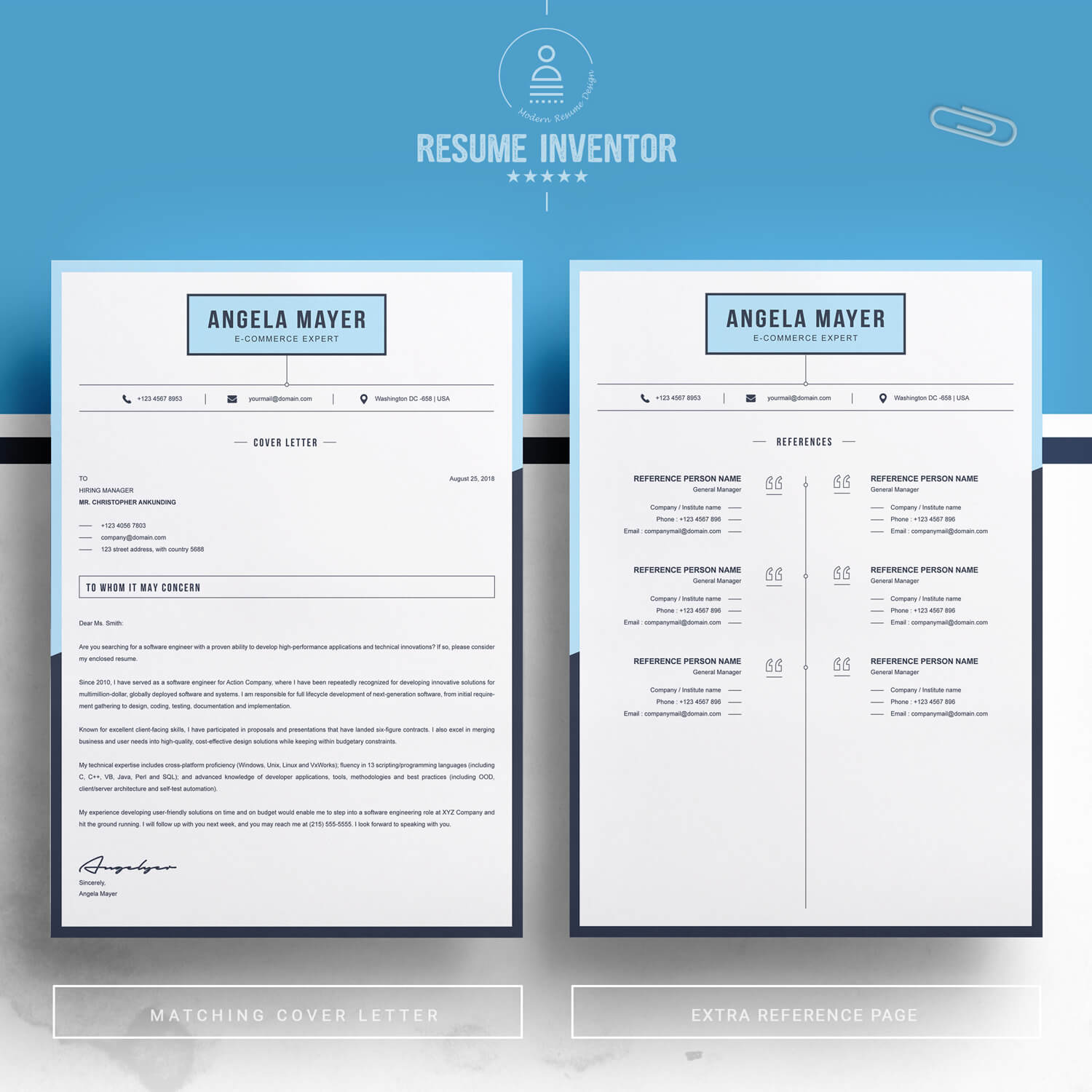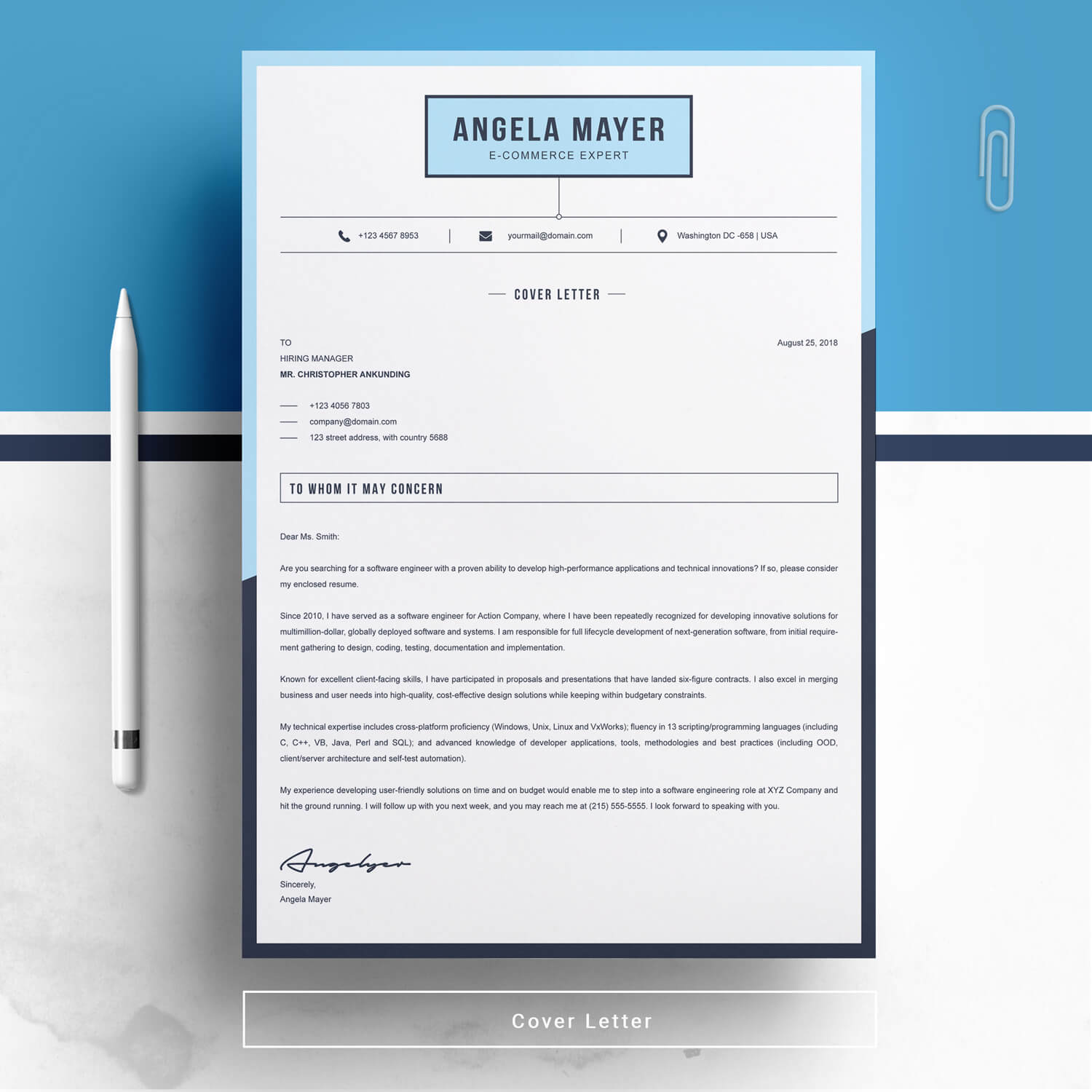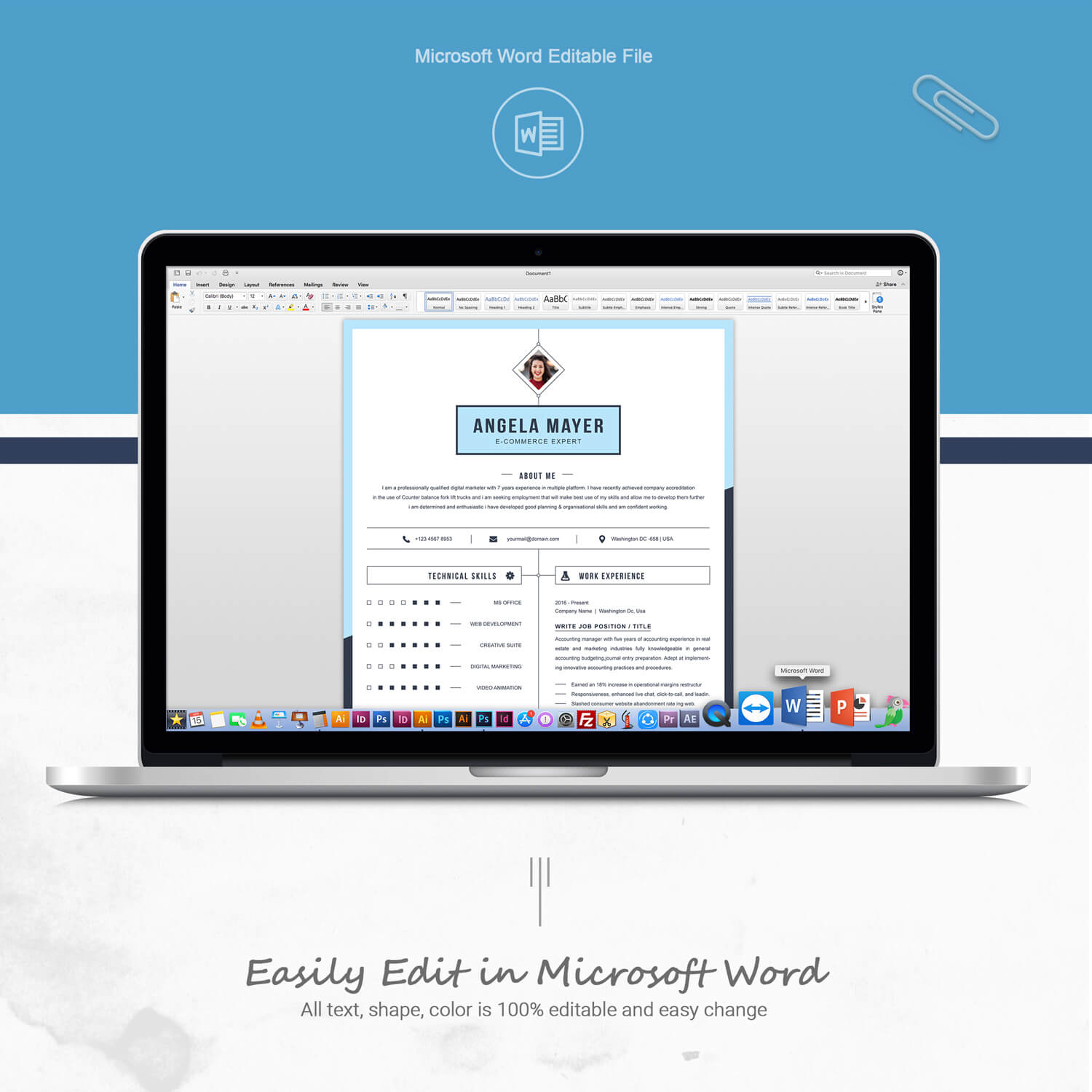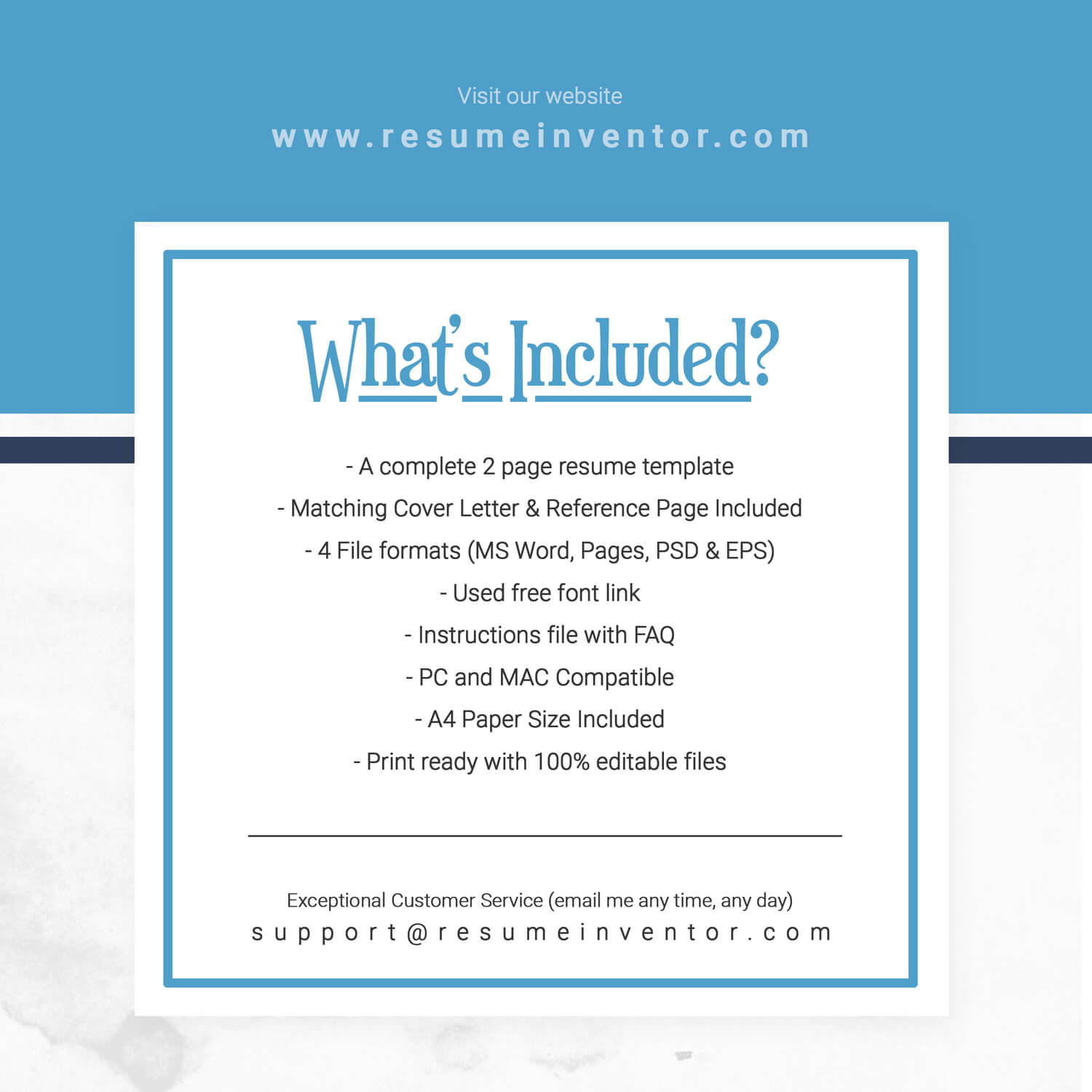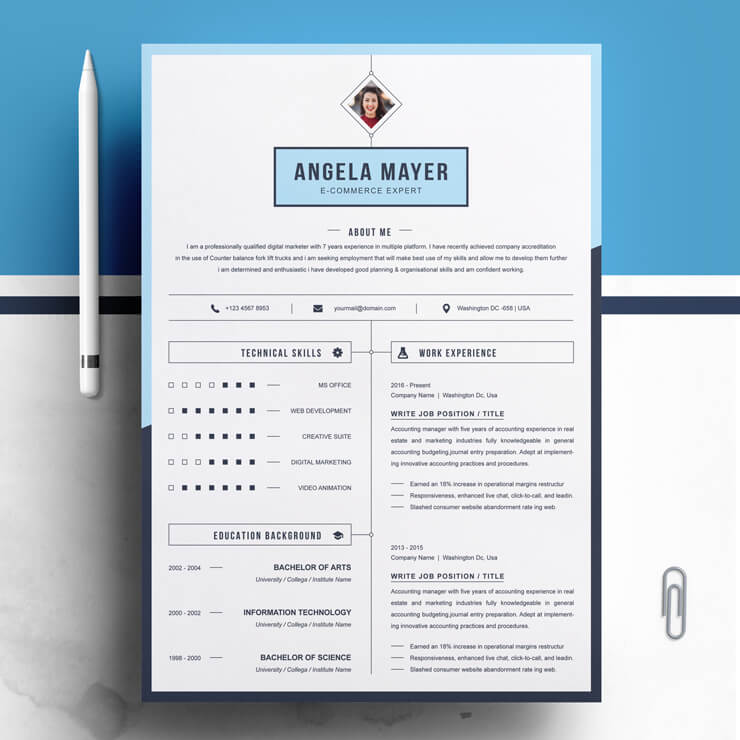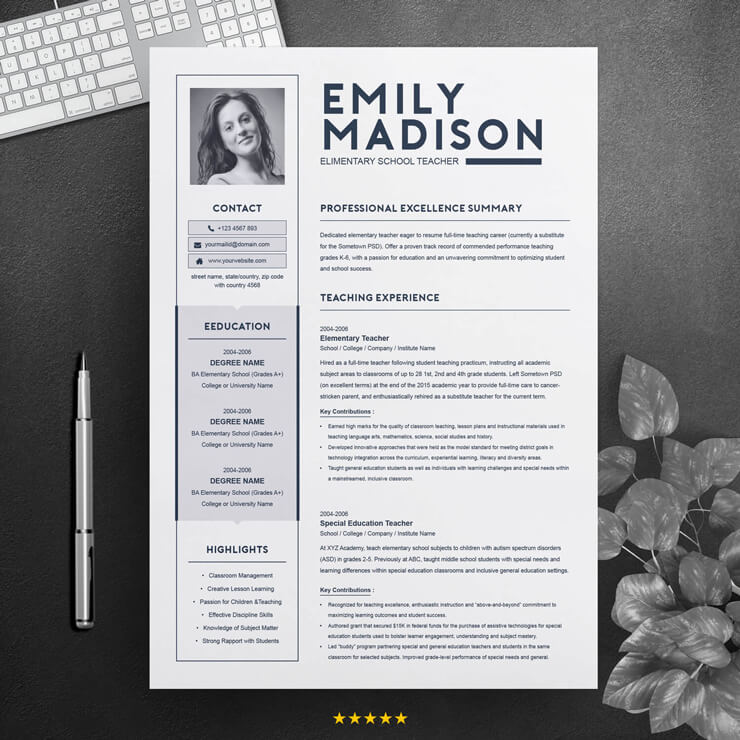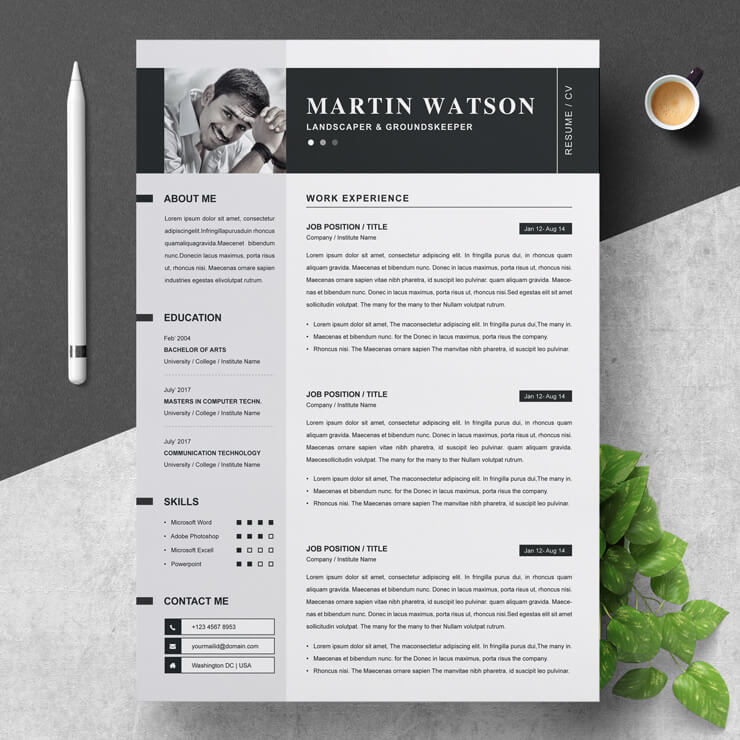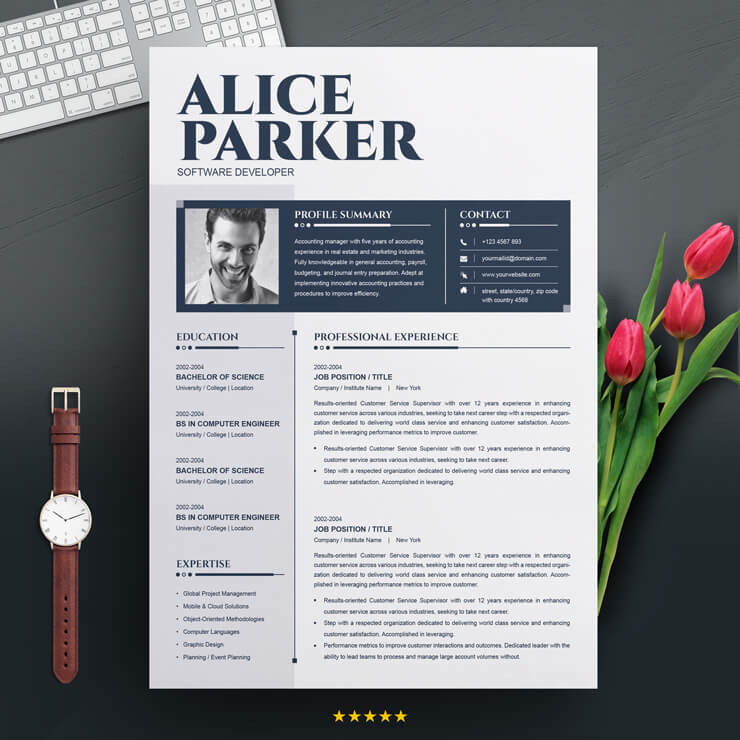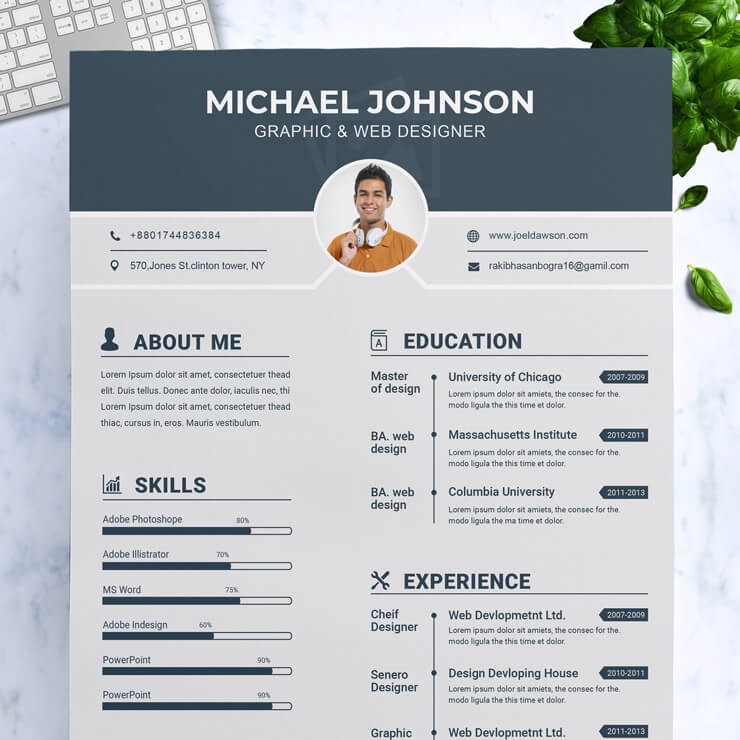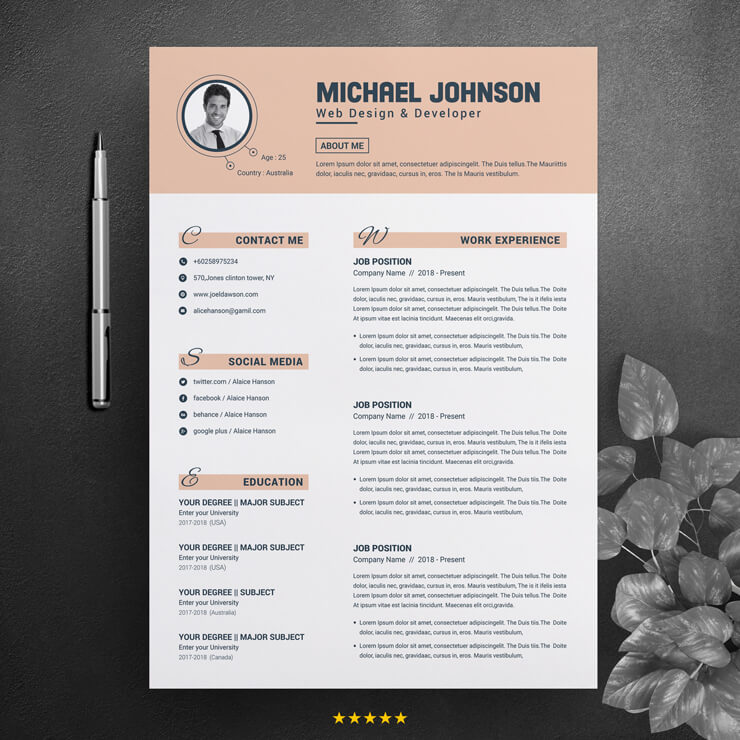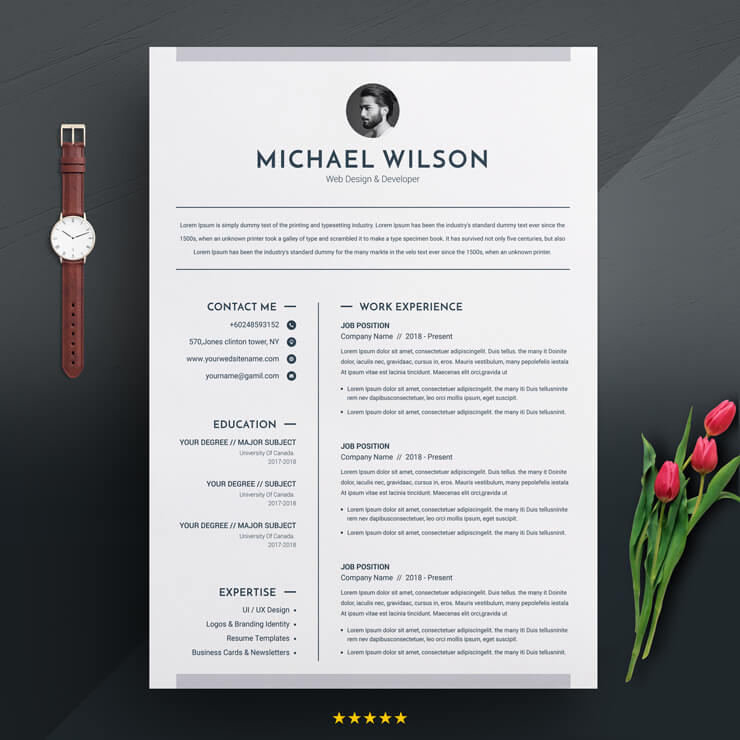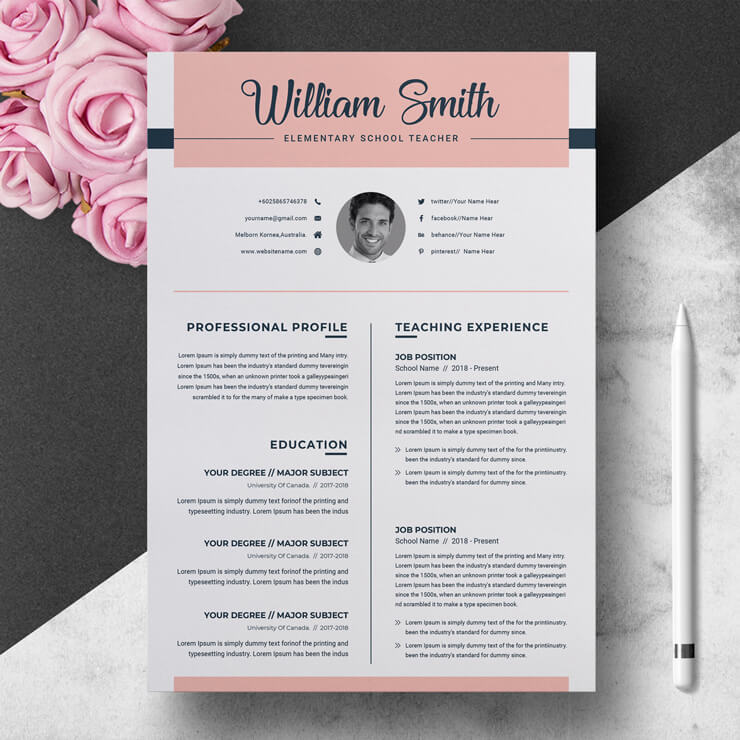E-Commerce Specialist Resume Template: Example, Job Description & Guide
The E-commerce Specialist Resume template is designed to enhance your chances of landing a job in the dynamic world of online retail. This template is tailored specifically for professionals specializing in e-commerce, providing a comprehensive and visually appealing format.
It includes a matching cover letter that complements the resume, helping you make a lasting impression.
With a sleek design and organized sections, this template offers a professional and polished representation of your skills, experience, and achievements in the e-commerce industry. Elevate your resume and boost your chances of success with this premium template.
What Is an E-commerce Specialist?
An e-commerce specialist is a professional who specializes in managing and optimizing online sales channels for businesses. They are responsible for planning to increase online sales, improve the customer experience, and get more people to visit e-commerce websites.
What Skills Should an E-Commerce Specialist Have?
To succeed as an e-commerce specialist, you need technical and soft skills. Some of the key skills include:
- Knowledge of e-commerce platforms, such as Shopify, Magento, and WooCommerce
- Familiarity with digital marketing channels, such as SEO, SEM, and social media marketing
- Expertise with web analytics tools like Google Analytics and Adobe Analytics
- Strong analytical and problem-solving skills
- Excellent communication and collaboration skills
- Attention to detail and ability to multitask
E-commerce Specialist Duties and Responsibilities
The duties and responsibilities of an e-commerce specialist may vary depending on the company and industry. However, some common tasks include:
- Developing and implementing e-commerce strategies to increase online sales
- Managing and optimizing online sales channels, such as e-commerce websites, marketplaces, and social media platforms
- Doing research on the market to find trends and opportunities in the e-commerce industry
- Analyzing website traffic and sales data to identify areas for improvement
- Collaborating with cross-functional teams to ensure a seamless customer experience across marketing, IT, and customer service departments.
Key Sections of an E-commerce Specialist Resume
An e-commerce specialist’s resume should include the following sections:
- Contact information: Must include your name, phone number, email address, and LinkedIn profile (if applicable).
- Professional Summary: Write a concise summary that highlights your experience, skills, and achievements in the e-commerce industry. Tailor it to the specific job you are applying for.
- Skills: List hard and soft skills relevant to the e-commerce field. Include skills such as SEO/SEM, advertising, copywriting, web design, brand management, creating marketing campaigns, Google Analytics, analyzing sales data, documenting and reporting, CMS proficiency, adaptability, marketing, teamwork, and communication skills.
- Work experience: Include job titles, company names, dates of employment, as well as a description of your responsibilities and accomplishments. Use bullet points to make it easy to read and scan.
- Education: Include your educational background, such as degrees, certifications, and relevant coursework.
- Certifications (if applicable): List any certifications you have obtained that are relevant to the e-commerce field, such as Google Analytics certification or certifications in specific e-commerce platforms.
- Awards and achievements (if applicable): Highlight any notable awards or achievements you have received in your e-commerce career, such as recognition for successful campaigns or exceeding sales targets.
E-commerce Specialist Job Description
An e-commerce specialist’s job description typically includes the following:
Job title: E-commerce Specialist
Job type: Full-time
Job location: [Location]
Job Summary: The e-commerce specialist will develop and implement e-commerce strategies to increase online sales and improve the customer experience. They will collaborate closely with other departments to make the customer’s experience as smooth as possible.
Key responsibilities:
- Develop and implement e-commerce strategies to increase online sales.
- Manage and optimize online sales channels like e-commerce websites, marketplaces, and social media platforms.
- Find out what people are thinking and doing in the e-commerce market.
- Analyze website traffic and sales data to identify areas for improvement.
- Coordinate with other departments (like marketing, IT, and customer service) to provide a unified service to customers.
Qualifications:
- Bachelor’s degree in marketing, business, or a related field
- [Number] years of experience in e-commerce management or a related field
- Proficiency in e-commerce platforms, such as Shopify, Magento, and WooCommerce
- Familiarity with digital marketing channels, such as SEO, SEM, and social media marketing
- Strong analytical and problem-solving skills
- Excellent communication and collaboration skills
- Attention to detail and ability to multitask
Dos and Don’ts
Dos:
- Customize your resume for each job application to highlight your relevant skills and experience.
- Make your resume easy to read and scan by using bullet points.
- Use specific numbers and metrics to show how much you’ve done.
- Use action verbs to talk about what you’ve done and what you’re responsible for.
- Include keywords from the job description that are relevant to your resume.
- Proofread your resume carefully to avoid typos and grammatical errors.
Don’ts:
- Don’t use a generic resume for all job applications.
- Don’t include irrelevant information, such as hobbies or personal details.
- Don’t use a fancy or complicated design that makes your resume difficult to read.
- Don’t lie or exaggerate your qualifications or experience.
- Don’t use passive language or vague descriptions of your responsibilities.
- Unless the employer specifically requests references, please don’t include them on your resume.
Common Mistakes To Avoid
Some common mistakes to avoid when writing an e-commerce specialist resume include:
- Putting too much emphasis on technical skills and not enough on soft skills like communication and working with others.
- Using a generic resume that doesn’t highlight your relevant experience and achievements.
- Including irrelevant information, such as hobbies or personal details.
- Using a complicated or fancy design that makes your resume difficult to read.
- Failing to quantify your achievements with specific numbers and metrics.
- Using passive language or vague descriptions of your responsibilities.
- Making typos or grammatical errors.
E-commerce Specialist Resume Design and Formatting Tips
Here are some design and formatting tips for an e-commerce specialist’s resume:
- Use a clean, simple design and easy to read and scan.
- Use bullet points to make your information easy to read and organize.
- Use a professional font between 10 and 12 points, like Arial or Times New Roman.
- Use bold and italic formatting sparingly to highlight important information.
- Use white space to break up your resume into sections and make it visually appealing.
- Use a consistent format for dates, job titles, and company names.
- Save your resume as a PDF so it will look the same on all devices.
Cover Letter Writing Tips
A cover letter is essential to a job application that introduces you to the employer and explains why you are the best fit for the job. Here’s how to write a cover letter to go with your e-commerce specialist resume:
- Customize your cover letter: Customize your cover letter for each job application to show the employer that you have read the job description and understand the position’s requirements.
- Address the hiring manager: Address the hiring manager by name if possible. If you don’t know the name, use a generic salutation such as “Dear Hiring Manager.”
- Introduce yourself: In the first paragraph, introduce yourself and explain why you are interested in the job. Mention the job title and where you found the job posting.
- Highlight your skills and experience: In the second paragraph, emphasize your skills and experience that make you an ideal candidate for the position. Use specific examples to demonstrate your qualifications.
- Show your enthusiasm: In the third paragraph, demonstrate your interest in the position and the company. Explain why this opportunity excites you and how you can contribute to the company’s success.
- Close with a call to action: In the final paragraph, close with a call to action. Express your eagerness to participate in an interview while thanking the company for their time in reviewing your resume. Provide your contact information and encourage the employer to contact you.
Some Common E-Commerce Specialist Interview Questions & Answers Example
Here are some e-commerce specialist interview questions and answers based on the search results:
What experience do you have in the e-commerce sector?
I have [number] years of experience in the e-commerce sector. In my previous jobs, I managed e-commerce websites, developed and implemented e-commerce strategies, and worked with teams from different departments to ensure customers had a smooth experience. I have also worked with various e-commerce platforms and technologies, such as Shopify, Magento, and WooCommerce.
What are your strengths and weaknesses as an e-commerce specialist?
My strengths as an e-commerce specialist include my strong analytical and problem-solving skills, proficiency in e-commerce platforms and technologies, and ability to collaborate effectively with cross-functional teams. My weakness is that I tend to get too focused on the details and sometimes struggle to see the big picture. However, I have been working on improving my strategic thinking skills and have learned to balance the details with the larger goals.
How do you stay up-to-date with the latest e-commerce trends and technologies?
I stay up-to-date with the latest e-commerce trends and technologies by attending industry conferences, reading industry publications and blogs, and participating in online forums and communities. I also take online courses and certifications to improve my skills and knowledge.
Can you describe a time when you had to deal with a difficult or challenging client in the e-commerce industry?
In my previous role, I had a client who was unhappy with the website design and layout we had developed for them. I listened to their concerns and worked with the design team to make the necessary changes. I also provided regular updates and progress reports to the client to keep them informed and ensure that we were meeting their expectations.
How do you measure the success of an e-commerce campaign?
I measure the success of an e-commerce campaign by analyzing website traffic and sales data, tracking key performance indicators (KPIs), and comparing the results to the campaign goals. I also gather feedback from customers and stakeholders to evaluate the overall customer experience.
What e-commerce platforms and technologies are you proficient in?
I am proficient in various e-commerce platforms and technologies, including Shopify, Magento, WooCommerce, Google Analytics, and Adobe Analytics. I also have experience with SEO and SEM for e-commerce websites.
How do you ensure a seamless customer experience across different e-commerce channels?
I ensure a seamless customer experience across different e-commerce channels by developing and implementing a consistent brand voice and messaging, optimizing the website design and layout for different devices, and providing excellent customer service and support.
Can you describe a time when you had to work with cross-functional teams to achieve an e-commerce goal?
I worked with the marketing, IT, and customer service teams in my previous role to develop and implement a new e-commerce strategy. We worked together to make a new design for the website, make it better for search engines, and improve the customer experience. We also worked together to track and analyze the results and adjust as needed.
How do you approach SEO and SEM for e-commerce websites?
I approach SEO and SEM for e-commerce websites by conducting keyword research, optimizing website content and metadata, and developing and implementing a targeted advertising campaign. I also track and analyze the results to identify areas for improvement.
Can you give an example of a successful e-commerce campaign you have managed in the past?
In my previous role, I managed an e-commerce campaign that increased website traffic by 50% and sales by 25% within six months. We achieved this by developing a targeted advertising campaign, optimizing the website for search engines, and improving the customer experience.
How do you analyze website traffic and sales data to identify areas for improvement?
I track key performance indicators (KPIs) like conversion rates, bounce rates, and average order value when I look at website traffic and sales data. I also use web analytics tools like Google Analytics and Adobe Analytics to gather data and identify trends. I then use this information to develop and implement strategies to improve website performance.
Can you describe a time when you had to adapt to a new e-commerce platform or technology?
In my previous role, I had to adapt to a new e-commerce platform when the company decided to switch from Magento to Shopify. I took online courses and certifications to learn the new platform and worked with the IT team to migrate the website and data to the new platform.
How do you prioritize and manage your e-commerce tasks and responsibilities?
I prioritize and manage my e-commerce tasks and responsibilities by setting clear goals and deadlines, using project management tools, and collaborating with cross-functional teams. I also regularly evaluate my progress and adjust my priorities as needed.
Can you explain your experience with creating and managing marketing campaigns for e-commerce websites?
In my previous roles, I have created and managed marketing campaigns for e-commerce websites, including developing advertising strategies, creating content and graphics, and tracking and analyzing the results. I’ve used many different marketing methods, such as email marketing, marketing on social media, and paid advertising.
How do you ensure the security and privacy of customer data in e-commerce transactions?
I ensure the security and privacy of customer data in e-commerce transactions by implementing security measures, such as SSL certificates and two-factor authentication, and complying with industry regulations, such as PCI DSS. I also regularly monitor and update the website and systems to ensure that they are secure and up-to-date.
FAQs
Here are some frequently asked questions (FAQs) related to an e-commerce specialist’s resume:
What are the essential skills of an e-commerce specialist?
The essential skills for an e-commerce specialist include proficiency in digital marketing, understanding of e-commerce platforms, data analysis, customer relationship management (CRM), and strong communication skills.
How can I tailor my resume to a specific e-commerce industry?
To tailor your resume to a specific e-commerce industry, research the industry’s requirements and include relevant keywords, skills, and accomplishments that align with the sector. Customize your resume to highlight experiences related to that particular industry.
Should I tailor my e-commerce specialist resume for each job application?
Yes, it is highly recommended to tailor your e-commerce specialist resume for each job application. This lets you highlight the skills, experiences, and qualifications most relevant to the job you are applying for.
How long should an e-commerce specialist’s resume be?
An e-commerce specialist’s resume should ideally be one to two pages long. It should be concise and focused, highlighting your most relevant skills, experiences, and achievements. Avoid including unnecessary details or information not directly related to the position you are applying for. Use lists and paragraphs to present information in a clear and organized manner.
Can I include references in my e-commerce specialist resume?
It is generally not necessary to include references in your e-commerce specialist resume. Instead, you can provide a separate list of references upon request during the interview process. This allows you to control who sees your references and ensures they are relevant to the job you are applying for.
Should I include a cover letter with my e-commerce specialist resume?
Including a cover letter with your e-commerce specialist resume is highly recommended. A cover letter lets you introduce yourself, explain your interest in the position, and highlight your relevant skills and experiences.
INCLUDES:
- Cover Letter Template (can also use as a Thank You letter)
- Microsoft Word (.docx) files
- Apple Pages (.pages) files
- Photoshop (PSD) Files
- Illustrator (EPS) Files
- Detailed Instructions file
- A4 Paper Size Included
- Links to free fonts used
- 24/7 hours Fast and friendly customer service
Share Now!
